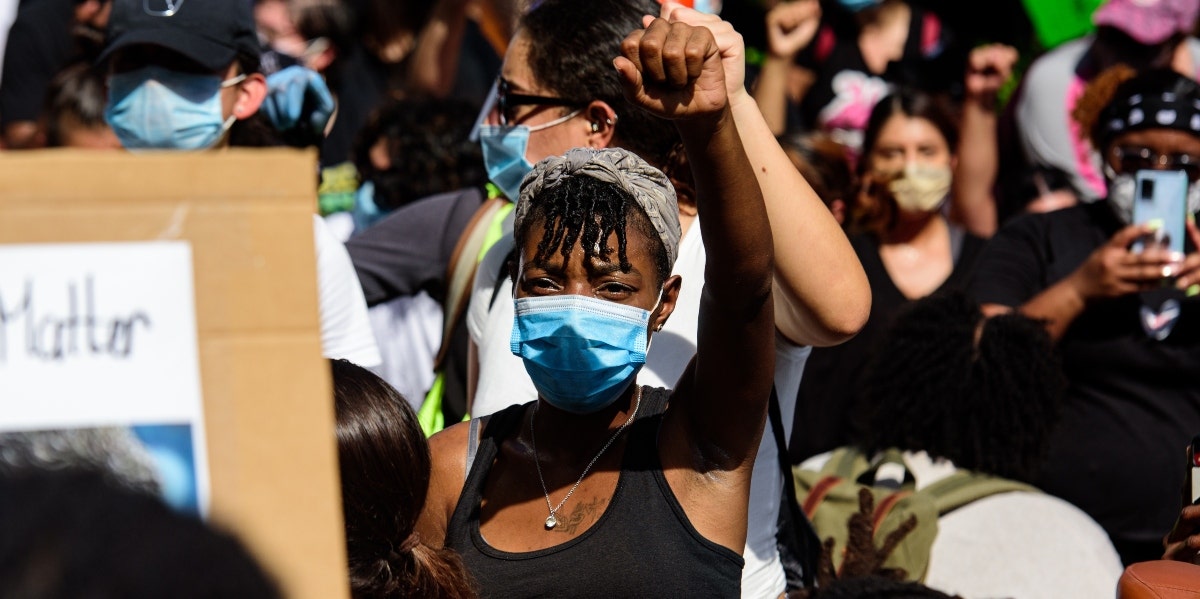Nobody Is Born Racist
What was it like growing up white in apartheid South Africa?
 getty
getty Do you learn racism and racist tendencies? When George Floyd was choked to death by a white policeman, it triggered bad memories of my own childhood growing up in apartheid South Africa where racism was an institutionalized system for more than four decades.
Children are color blind. I recall a carefree childhood swimming with black children in the river and crafting toys from wire and scrap metal.
As Nelson Mandela so pointedly emphasized: "No one is born hating another person because of the color of his skin or his background or his religion. People must learn to hate, and if they can learn to hate, they can be taught to love, for love comes more naturally to the human heart than its opposite."
I only became aware of the differences between "them" and "us" when the black children went to their school in a run-down township and us, whites, went to our privileged boarding school.
Black South Africans were commonly referred to as "kaffirs" by whites, a derogatory term used in the same way as the "n" word in the United States.
The system of apartheid was entrenched by discriminatory laws at all levels of South African society. Blacks were only allowed to live in certain areas under the Group Areas Act.
The Job Reservation Act excluded blacks from most well-paid professions. Sexual relations between persons of different races were prohibited under the Mixed Marriages Act. The best parks, beaches, hotels, and restaurants were reserved exclusively for whites.
Television was only introduced countrywide in South Africa in January 1976, only months before the Soweto uprising on June 16th of that year.
Suddenly, the shocking images of white policemen opening fire on innocent black schoolchildren protesting against an inferior education system could be seen on the main evening news in every white living room.
But it was one of the many images that remain deeply etched in faraway childhood memory. The comments from fellow white relatives still ring in my ears: "Serves them right. The k*ffirs deserve to be shot!"
Working as a young reporter for a daily newspaper, I once came across a group of burly white men standing around a bleeding black man on the ground.
"You must die now, k*ffir," one of them ranted.
South Africa faced its past in a public hearing called the Truth and Reconciliation Commission after the first democratic elections in 1994.
Victims of gross human rights violations testified. The perpetrators also gave testimony and were granted amnesty from criminal proceedings if they acknowledged the wrongdoings of the past.
It's not enough merely to name the wrongdoings of the past.
Like South Africa, the United States needs a collective acknowledgment and societal consensus that injustice, racism, slavery, and police violence against blacks has been a daily reality for generations.
In Germany, where I lived and worked for more than 20 years, the country’s dark history under the Nazi era is an integral part of the education system.
Visits to the Holocaust Museum in Berlin and the former Nazi concentration camps of Dachau, Buchenwald, or Bergen-Belsen are a fixed part of the school curriculum.
The founders of modern Germany never again wanted history to repeat itself.
In Spain, where I live today, the students are made aware from the grade-school level that there is no such thing as one Spanish nationality or ethnicity. The population has, for millennia, been a mixture of Iberian, European, Arab, and North African.
Finding purpose in a global awakening.
Maybe some purpose and meaning can be found in the death of George Floyd whose name is now inexorably linked to a global awakening.
Every human should be given the liberty to walk and breathe without fear of dying under the knee of a policeman.
Love, solidarity, and compassion come more naturally to the human heart than hatred.
Racism is one of the worst traits of human character. It not only dehumanizes the victim but also the perpetrator.
But as Nelson Mandela so succinctly put it: "Nobody is born a racist."
The seeds of racism grow from prejudice in societies that are fundamentally exploitative with the injustice going back many generations in a deep divide between the haves and the haves-not.
From a spiritual perspective, we need to understand that diversity is a principle of life.
Racism is the separation from true human nature and the evolutionary principle of creation. Any species that seeks to dominate and exploit rather than adapt to changing circumstances is doomed.
Reino Gevers is a life coach and author. In his book new book Deep Walking for Body, Mind, and Soul, he has chronicled how pilgrims walk-off personal problems and build resilience. For more information, visit his website.

